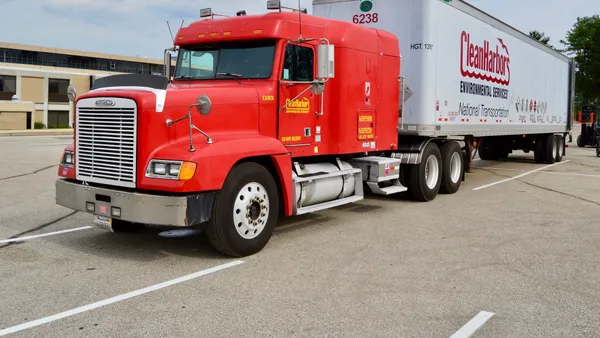Dive Brief:
- The U.S. Environmental Protection Agency released last week its finalized volumes for the Renewable Fuel Standard in 2019. The requested amount of cellulosic biofuel increased from 288 million gallons in 2018 to 418 million gallons in 2019.
- According to the American Biogas Council (ABC), 388 million gallons of those 418 million gallons are requested from biogas. ABC defines biogas systems as those that process organic material, such as food waste, yard waste, sewage sludge and animal manure.
- ABC praised the EPA's move in increasing the volume of request biogas, but said it was "disappointed" that the 2019 rule "shows zero progress" in incentivizing electricity generation from biogas. "This important part of the RFS has remained fallow since its inclusion in EPA's 2014 Final Rule," the council said.
Dive Insight:
In an interview with Waste Dive, ABC's Executive Director Patrick Serfass said the industry has shown significant growth in the past year. According to Serfass, there are approximately 64 renewable natural gas projects currently online — compared to 50 in 2015 — and about 2,200 operational biogas systems nationwide. There are also around 30 projects currently under construction that are "close" to going online.
"So there is substantial growth in the industry," Serfass concluded.
Part of the reason behind the growth, he said, is that the biogas industry is seeing some enhanced stability now that the Trump administration is past its earliest days and a previous 90-day stay on RFS volumes ran out. There had initially been some concern that the Trump administration might dramatically change the RFS — a discussion that caused financiers and other potential project backers to hold off on starting new projects.
"The industry wanted to see what the new president would do," Serfass said. "There's a bit of a catch-up now."
But it hasn't been all good news for the biogas industry. Trump's EPA has handed out small refinery exemptions, allowing oil producers to bypass the requirements for producing renewable fuel or purchasing Renewable Identification Numbers.
If there are fewer producers who need to purchase RINs from the biogas industry, the price of biogas will naturally fall as demand decreases. The EPA already didn't re-assign gallons of biofuel lost to refiners that were given an exemption in the past year, prompting frustration across the industry, according to Politico.
Serfass said two of the most important issues for the biogas industry are releasing the renewable volumes in a timely manner while ensuring those volumes reflect growth in the biogas industry. Perhaps the third priority for ABC, Serfass said, is ensuring that small refinery exemptions aren't given out at the same frequency as have been so far during the Trump administration.










